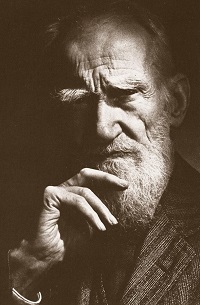The Sergeant putting Sweetie away It’s a queer thing, isn’t it, that though there is a point at which I’d rather kiss a woman than do anything else in the world, yet I’d rather be shot than let anyone see me doing it?
The Elder Sir: women are not, as they suppose, more interesting than the universe. When the universe is crumbling let women be silent; and let men rise to something nobler than kissing them.
The Sergeant, interested and overawed, sits down quietly and makes Sweetie sit beside him as before. The Elder continues to declaim with fanatical intensity.
The Elder Yes, sir: the universe of Isaac Newton, which has been an impregnable citadel of modern civilization for three hundred years, has crumbled like the walls of Jericho before the criticism of Einstein. Newton’s universe was the stronghold of rational Determinism: the stars in their orbits obeyed immutably fixed laws; and when we turned from surveying their vastness to study the infinite littleness of the atoms, there too we found the electrons in their orbits obeying the same universal laws. Every moment of time dictated and determined the following moment, and was itself dictated and determined by the moment that came before it. Everything was calculable: everything happened because it must: the commandments were erased from the tables of the law; and in their place came the cosmic algebra: the equations of the mathematicians. Here was my faith: here I found my dogma of infallibility: I, who scorned alike the Catholic with his vain dream of responsible Free Will, and the Protestant with his pretence of private judgment. And now-now-what is left of it? The orbit of the electron obeys no law: it chooses one path and rejects another: it is as capricious as the planet Mercury, who wanders from his road to warm his hands at the sun. All is caprice: the calculable world has become incalculable: Purpose and Design, the pretexts for all the vilest superstitions, have risen from the dead to cast down the mighty from their seats and put paper crowns on presumptuous fools. Formerly, when differences with my wife, or business worries, tried me too hard, I sought consolation and reassurance in our natural history museums, where I could forget all common cares in wondering at the diversity of forms and colors in the birds and fishes and animals, all produced without the agency of any designer by the operation of Natural Selection. Today I dare not enter an aquarium, because I can see nothing in those grotesque monsters of the deep but the caricatures of some freakish demon artist: some Zeus-Mephistopheles with paintbox and plasticine, trying to surpass himself in the production of fantastic and laughable creatures to people a Noah’s ark for his baby. I have to rush from the building lest I go mad, crying, like the man in your hook, “What must I do to be saved?” Nothing can save us from a perpetual headlong fall into a bottomless abyss but a solid footing of dogma; and we no sooner agree to that than we find that the only trustworthy dogma is that there is no dogma. As I stand here I am falling into that abyss, down, down, down. We are all falling into it; and our dizzy brains can utter nothing but madness. My wife has died cursing me. I do not know how to live without her: we were unhappy together for forty years. My son, whom I brought up to be an incorruptible Godfearing atheist, has become a thief and a scoundrel; and I can say nothing to him but “Go, boy: perish in your villainy; for neither your father nor anyone else can now give you a good reason for being a man of honor.”
(Source: George Bernard Shaw: Too True to be Good—Act III (origin: 1931) In: Too True To Be Good · Village Wooing · On The Rocks. Three plays. London: Constable & Company Ltd., [1934?].)
